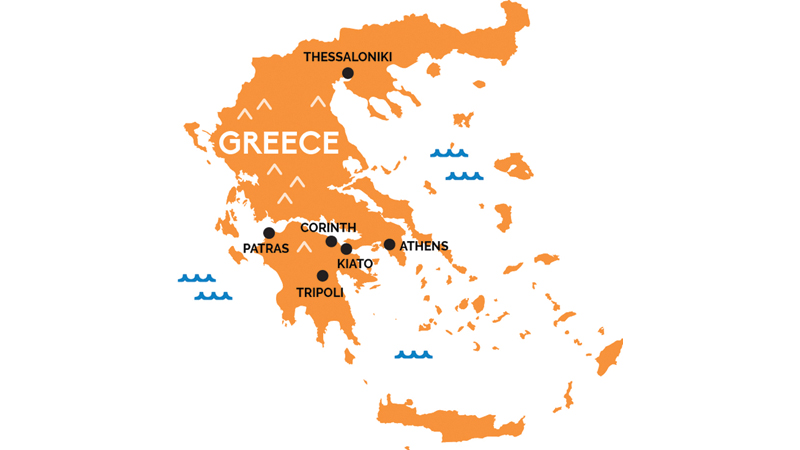- An analysis by Emeritus Prof. Sirimal Abeyratne, Faculty of Economics, University of Colombo
- Countries that overcame the debt crisis
Greece is located in South-Eastern Europe at the southern tip of the Balkan Peninsula. Its land borders Albania, the Republic of Macedonia with Bulgaria to the north and Turkey to the east. Greece has the tenth longest coastline in the world. The country is also known as the birthplace of Western civilisation and democracy.
Greece has been a member of the European Union (EU) since 1981 and EU’s Economic and Financial Committee since 2001. It has been a NATO member since 1952 and the European Space Agency (ESA) since 2005. Greece is also founding member of the United Nations, the Organization for Economic Cooperation and Development (OECD) and the Black Sea Economic Cooperation (BSEC). Its capital is Athens, a historic city.
 However, in 2009, Greece fell into a huge economic crisis. The severe economic collapse was a major red flag for other European nations. The International Monetary Fund (IMF) supported Greece’s economic recovery, alongside the EU and the European Central Bank (ECB). Together, these three organisations provided 80 billion euros in loans and aid to Greece and the country took a considerable time to fully recover from the crisis.
However, in 2009, Greece fell into a huge economic crisis. The severe economic collapse was a major red flag for other European nations. The International Monetary Fund (IMF) supported Greece’s economic recovery, alongside the EU and the European Central Bank (ECB). Together, these three organisations provided 80 billion euros in loans and aid to Greece and the country took a considerable time to fully recover from the crisis.
Before discussing the strategies Greece used to recover from its economic crisis, we need to discuss how it got into the crisis.
The US financial crisis of 2009 triggered Greece’s crisis. The collapse greatly affected countries that were more connected to the US. As a country with economic ties to the rest of the world, it directly affected European countries. The Greek crisis was the direct result of the country being a part of the EU.
However, Greece’s debt was issued in Euros. Even then, Greece had to borrow from an international currency. Sri Lanka also conducts loan transactions in rupees and dollars. But Greece is not such a country; it did not have separate domestic debt and foreign debt. All transactions are done in Euros.
Following the economic crisis, the debt burden of Greece increased greatly. At the time of the crisis, there was a debt of about US$ 350 billion. It is much larger than 100 percent of the GDP. After the real situation was revealed, the trust of lender countries was broken.
Measures
General opinion was that Greece would be unable to pay its massive debt. It was a key factor in the Greek collapse. Those holding Greek Government Bonds arranged to return them to Greece, while others held them in European banks. These measures were taken to avoid the damage caused by the collapse of their economy. Accordingly, Greece’s bond prices began to decrease and interest rates also decreased.
Around 2012-2013, Greece’s interest rate went above 30 percent. But the condition that the interest rate in the Eurozone cannot be raised above three percent was imposed between those countries and there were agreements on the budget gap, debt burden and inflation; The Eurozone is held together by such agreements. When Greece’s interest rate rose above 30 percent, it was a complete breach of contract.
This was the true state of the crisis. When our country could not pay its debts, the foreign debt balance, the debt balance collected in dollars, and international bonds went down. Interest rates fell. It was the same in our country as in Greece.
However, several factors affected Greece. It is not an isolated country. Greece is part of the EU with many other countries using the same currency. Even though they undergo some changes only politically, they remain as one country. Its goods and services are imported and exported in an open market. Money can be circulated with a free environment for people to work.
This is in a region that has come to an agreement as a compromise. This situation was a strength for Greece. France, Germany, England and the Netherlands are strong countries in the same region. Also, three institutions supported Greece as a second force. That was the IMF, the ECB and the EU. All three stood by Greece at that time.
The countries granted financial loan assistance decided the policies to be followed. Those institutions also carried out the activities of monitoring whether those decisions are properly implemented. Thus, an important fact that happened during this crisis is that Greece was not isolated during the crisis like Sri Lanka. But at that time, a large number of crises had arisen in Greece.
When there is a crisis, the social crisis in any country escalates. The crisis in Greece was not due to the economic crisis. It is seen that more crises have arisen due to the remedies brought due to the economic crisis. During the crisis in Greece in 2016, conditions were imposed on the Government of that country by the EU and the ECB.
The Government of Greece did not agree to these conditions. So Greece held a referendum in 2016. Whether the Greek people should accept those terms or not was the question raised in the referendum. It was won by the majority of votes for the consensus that it would not be accepted. Greece clearly stated that it does not need the conditions of the Eurozone. But they needed their money.
Everyone
But even if Greece could make such a decision, it was not very successful. They were helped by other countries. The reason was that if Greece collapsed, it would take down other countries in the EU with it. So everyone helped Greece. This way, Europe was able to avert a total collapse. Even though Greece was on the brink of collapse, it was heavily bailed out. Institutions such as the EU and ECB also dealt with the purchase of bonds that were prejudiced at that time and could not be sold. Accordingly, it was possible to alleviate the crisis to a certain extent.
Also, another action followed by Greece is to bring policy amendments. That is, the gap between the Budget was re-adjusted, and the country was in debt to an unpayable level at the time. The reason for that debt is that the expenditure was more than the Greek government’s income. To adjust the gap between income and expenditure, income should be increased. Costs should be cut. Greece followed suit.
Efforts were made to increase tax revenue to expand the tax base to increase revenue. Costs were also cut. Transportation, housing, health etc. expenses and pensions under various subjects were cut. Pensions above a certain level were reduced. Also salary caps were imposed; the minimum wage requirement was brought down to a lower value.
Most of the country’s subsidies were removed, and so was the sale of State property. The Government’s gas companies and highways, airports and ports were transferred to the private sector. Thus State property was privatised. On the other hand, the reforms needed to build the economy and increase production to increase exports were able to gain investor confidence. The economy was able to go from a negative level to a positive one and move to a good economic standard only after the year 2018. However, by 2023, the amount of debt had increased. The reason for this is that the borrowing had increased during that period. But debt sustainability has increased at the same time. That is, the ability to repay the loan has increased.
According to these measures, there were reasons for Greece to recover economically. Interest rates have also come down and bond interest rates have bottomed out. Interest rates are currently lower than in the US. However, its decrease is good because it should be in line with the other countries of the EU.
Greece follows the EU’s legal systems. Labour laws, judicial system, etc. are aligned to those of the EU. Those countries were able to carry out the reforms even if there was opposition. Especially the dedication of the people of Greece to recover from the economic crisis was a big help to restore that country.









